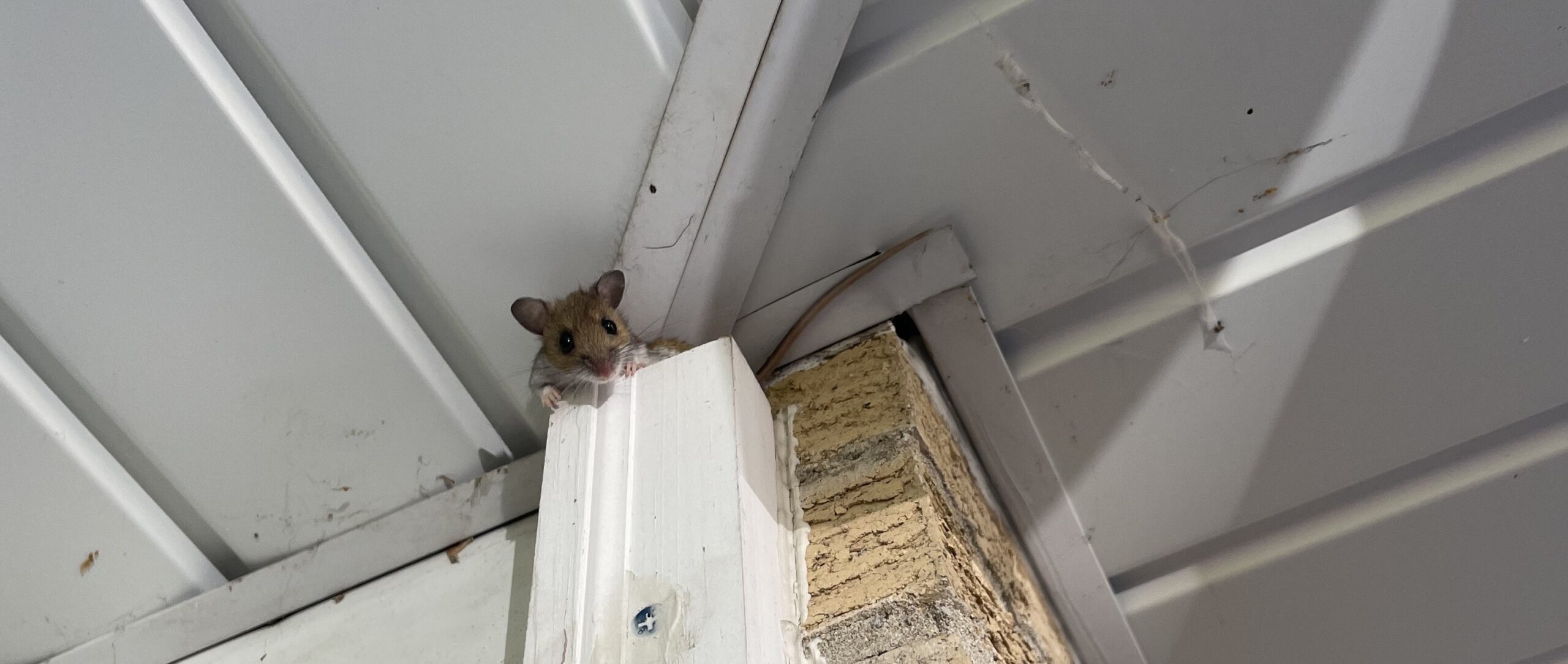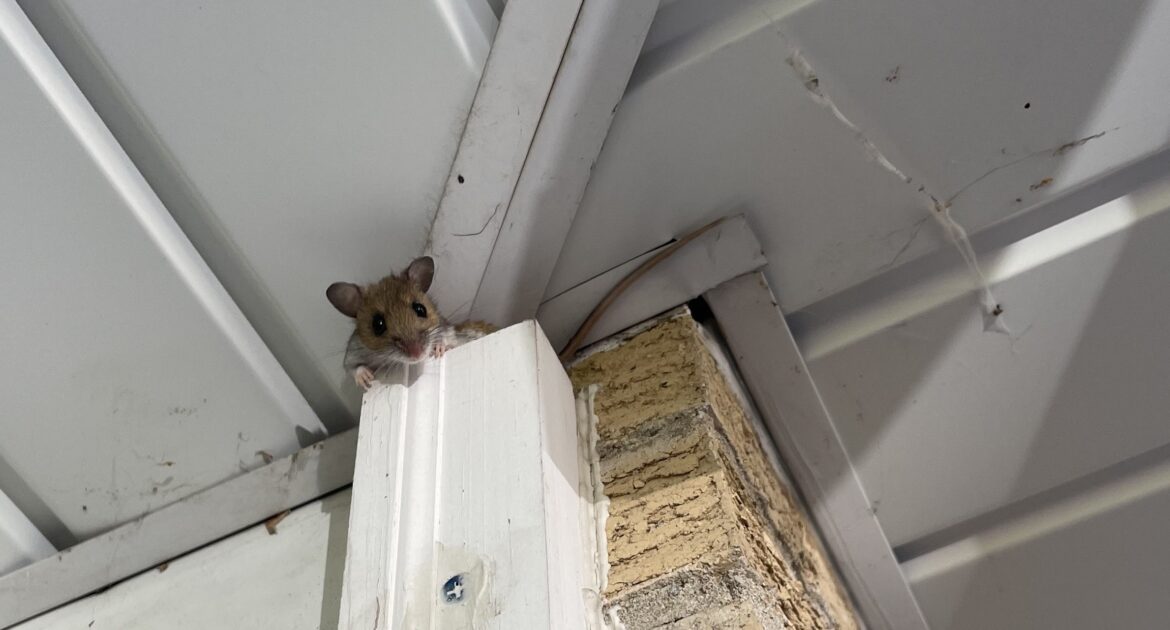Your kitchen might be the heart of your home, but for mice, it’s a five-star hotel. If you’ve spotted droppings, heard a faint scratching at night, or noticed gnawed food packages, it’s a clear sign that your kitchen might be offering everything mice love—warmth, shelter, and food. Crumbs on the floor, strong food odors, or even a small water leak are enough to attract these persistent pests. They’re experts at sneaking around, hiding in places like pantries, under appliances, and behind cabinets, making kitchens a common hotspot for infestations.
Don’t worry though—there are simple steps you can take to stop them in their tracks. At Skedaddle Humane Wildlife Control, we specialize in helping homeowners seal gaps, address problem spots, and prevent mice from making themselves at home. Let’s jump into some practical tips to protect your kitchen from these unwelcome guests.
The Food Factor: Why Mice Love Your Kitchen
Mice are always on the hunt for food, and your kitchen is a goldmine if food is left out or poorly stored. Even tiny crumbs or a torn cereal box can be enough to bring them in. These little creatures can chew through just about anything—plastic bags, cardboard, even some thin plastics—so food items in weak packaging are easy targets.
Here’s What You Can Do:
- Seal It Tight: Store all food, including pet food, in sturdy, airtight containers to block odors and prevent access.
- Clean as You Go: Wipe up crumbs, spills, or grease splatters quickly to avoid creating a buffet.
- Check for Problems: Regularly inspect your pantry for damaged packaging, chewing, or droppings.
Cutting off their food supply is the first, and perhaps the most effective way to make your kitchen a no-mice zone.
Hidden Water Sources You Might Be Overlooking
Mice don’t just come for the food—they need water too. And your kitchen is full of hidden opportunities they’ll exploit. A leaky pipe under the sink, condensation on the fridge, or even dishes left to soak overnight can be enough to keep them coming back.
Stop the Drips:
- Fix any leaking pipes or faucets as soon as you notice them.
- Wipe down counters and dry your sink daily to eliminate standing water.
- Don’t leave water in pet bowls overnight.
By cutting off their water sources, you’re making your kitchen significantly less attractive to these pests.
Cramped Clutter = Perfect Hiding Spots
Mice love to hide and feel secure, so cluttered spaces are like a paradise for them. Gaps behind heavy appliances or crowded, disorganized shelves make it easy for them to hide without being noticed.
Keep It Tidy:
- Organize your pantry and storage areas so they’re neat and easy to inspect.
- Declutter counters and avoid stacking items that could create new hiding spots.
- Check behind large appliances like your fridge or stove for signs of activity.
A clean, open kitchen is not only easier to maintain but also less appealing to critters looking for a cozy hiding spot.
Trash and Compost: A Buffet for Mice
Your trash can might be a bigger draw than you think. Mice can easily smell kitchen waste, especially strong-smelling items like leftovers or compost. If your bins aren’t sealed tightly, it’s like ringing the dinner bell for these unwanted visitors.
Make Your Bins Secure:
- Use durable trash cans with locking lids to keep pests out.
- Take out the trash regularly, especially after meals.
- Consider an enclosed compost system to contain smells and deter not just mice but other wildlife too.
Securing your waste storage is a simple step that goes a long way in keeping your space mouse-free.
Watch Out for Sneaky Entry Points
Even if your kitchen is spotless, mice can still find a way inside if you haven’t sealed potential entry points. These agile pests can squeeze through openings as small as a dime, so inspecting your home for gaps is critical.
Seal Every Crack:
- Check for gaps around doors, windows, and wall foundations, and seal them with caulk or steel wool.
- Inspect where pipes or cables enter your home and block any spaces around them.
- Make sure weatherstripping on doors and windows is in good condition.
Taking the time to seal your home is one of the best ways to stop mice from gaining access in the first place.
Odors That Reel Mice Into Your Kitchen
Have you noticed just how far the aroma of cooking travels? The smell of your favorite dish might be tempting more than just your family. Mice have a heightened sense of smell, and even tiny traces of food odors can attract them.
Keep Smells Under Control:
- Transfer ingredients like flour, sugar, and spices into airtight jars to lock in both freshness and scent.
- Deep clean regularly, especially under appliances, to clear food particles you might have missed.
- Take care of food-smelling waste immediately instead of leaving it overnight.
By reducing lingering odors, you’re making it far less likely for curious critters to venture into your kitchen.
A little preventive effort can go a long way when it comes to mouse-proofing your kitchen. By addressing food, water, clutter, and access points, you can stop infestations before they even start. And if things get out of hand, don’t hesitate to call Skedaddle Humane Wildlife Control. We’re here to help protect your space and give you peace of mind!
Trust Skedaddle Humane Wildlife Control in Atlanta
If you’re dealing with signs of a mice infestation in Atlanta, we’re here to help. At Skedaddle Humane Wildlife Control, we specialize in safe, humane animal control methods to get your home back to normal. Using one-way doors, we allow mice to leave your home without harm and prevent them from returning.
Our team also handles clean-up and sealing entry points to ensure the problem doesn’t repeat itself. If you’ve seen the signs or suspect mice might already be in your home, contact us today to schedule an inspection. We’re here to help you feel confident and comfortable in your home again.
Taking these small steps now will not only protect your kitchen but also give you peace of mind—all while creating a less inviting environment for mice.




